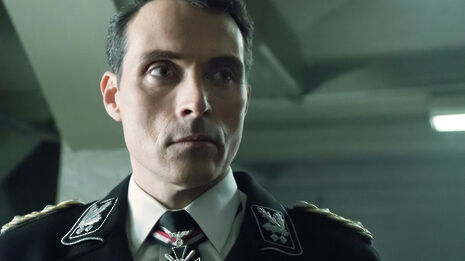TV Round-Up: The Man in the High Castle (Part Three)
Amazon’s dystopian thriller concludes with explosions, heart-break and timely relevance. As the many narrative ends are tied up, Josh Kimblin considers the show’s moral ambiguity.

This week, I watched an elderly man assume control of the most powerful nation in the world and extol the importance of patriotism to his subjects. In fact, I watched it happen twice. In our reality, Donald Trump took his oath and lectured the world on “American carnage”. In an alternate reality, Reichsminister Heusmann took the reins of the Third Reich after Hitler’s suspicious death and, within days, brought the world to the brink of atomic war. An omen for our universe? I hope not…
The Man in the High Castle concludes in strong form after a pallid mid-season. Hitler’s death is a catalyst for an acceleration in pacing, as plans swing into action. The first is Frank’s Resistance plot to blow up the Japanese government headquarters, which succeeds. The second is Heusmann’s plot to eradicate the Japanese empire with a vast atomic Blitzkrieg, which does not.
“In our reality, Donald Trump took his oath and lectured the world on American carnage”
The show is, at last, actually thrilling. The cinematography during the bomb sequence raises the pulse, while the interrogation of Juliana by the SS Officer John Smith serves spine-chills in equal measure. The screen-writers also provide convincing answers to a number of the show’s mysteries, including how the sought-after film reels (which show images of other realities) cross from one world to another.
However, our protagonists remain strangely devoid of intent and interest. Frank, having spent two seasons prevaricating, finally decides to act. Alas, his idea of constructive involvement is blowing up his oppressors and perhaps himself too – his fate remains uncertain.
“Their pursuit of atomic annihilation feels unintentionally comic: the shots of Heusmann gazing over Berlin, bathed in red light, recall Blofeld in his bunker”
Similarly, Joe undergoes a deeply unconvincing character flip-flop between wanting nothing to do with the Nazis, to wearing the uniform and Sieg-Heiling with the best, to having some ethical ‘concerns’ when his father (Heusmann) decides to unleash Armageddon. It’s a difficult character arc to portray credibly, though Luke Kleintank does his best.
The lack of engaging ‘heroes’ makes the show’s ‘villains’ all the more interesting. Whereas those who hate the totalitarian order have nothing to lose and seek only destruction, there are genuine conflicts of interests for those who have families and believe in their causes.
The show blurs the moral lines of conflict by humanising its supposedly ‘villainous’ presences: we are shown, irrefutably, that John Smith places family before all, while even Chief Inspector Kido of the Japanese Secret Police cracks a smile occasionally. When we first met Kido, he murdered a Jewish family in cold blood; how can he now be the most noble character on-screen?
The show sends the audience’s moral compasses into permanent spins in the finale, as it is Kido and Smith who act to prevent the atomic disaster, while the Resistance seeks only to disrupt and destroy. Frank is an especially amoral character in the end, acting solely out of revenge. Meanwhile, the previously kindly George Dixon reveals the horror of the “means-justifies-ends” logic employed by desperate people: “Yeah. I’m no better than them. If we want to beat the Nazis, then we’re gonna have to be worse.”
However, in a disappointing stylistic error on the show’s part, the pro-war Nazis veer dangerously towards a cartoonish depiction of evil. Their pursuit of atomic annihilation feels unintentionally comic: the shots of Heusmann gazing over Berlin, bathed in red light, recall Blofeld in his bunker. Similarly, the war room scene in which the plan for multiple atomic strikes is explained (“Destroy Tokyo in Phase One!”) is like watching Dr. Strangelove – but without the irony.
The evil of the show’s totalitarian regimes lies not in particular individuals but in the rules governing their societies: a school-boy proudly reciting the dates of the world’s greatest racial exterminations, or a German mother screaming as her terminally ill child is taken away to a gas chamber. Faceless, bureaucratic and cruel, this type of evil is hard to watch.
The show argues that evil lurks wherever ideological imperative trumps humanitarian concern, or when one group of people lays claim to a self-evident superiority over another. As I watch the week’s events on the news, that seems like an argument to remember
 Comment / Anti-trans societies won’t make women safer14 November 2025
Comment / Anti-trans societies won’t make women safer14 November 2025 News / Controversial women’s society receives over £13,000 in donations14 November 2025
News / Controversial women’s society receives over £13,000 in donations14 November 2025 News / John’s rakes in £110k in movie moolah14 November 2025
News / John’s rakes in £110k in movie moolah14 November 2025 Fashion / You smell really boring 13 November 2025
Fashion / You smell really boring 13 November 2025 Music / Three underated evensongs you need to visit14 November 2025
Music / Three underated evensongs you need to visit14 November 2025









